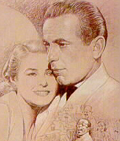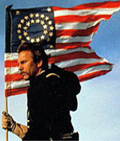|
Study Guide -
Glory (1989)
Director : Edward Zwick
Stars :
Matthew Broderick .... Col. Robert Gould Shaw
Denzel Washington ... Pvt. Trip
Cary Elwes ... Maj. Cabot Forbes
Morgan Freeman .... Sgt. Maj. John Rawlins
Preparation :
Read the movie reviews by Roger Ebert, James Berardinellis and by Vincent Canby (NY Times)
Historical/Social Significance :
Glory is "Hollywood's best film on the Civil War." "A terrific, highly accurate film, with in-your-face combat choreography and incredible period detail." 1
"Glory is not only the first feature film to treat the role of the black soldiers in the American Civil War, [but] also the most powerful and historically accurate movie about war that was ever made." James McPherson -Pulitzer Prize winner
Synopsis :
At the outbreak of the war blacks were not allowed to join the army. This was in a large part due to the North statement that the war was to preserve the Union, not to overthrow slavery. After the Emancipation Proclamation (Jan. 1863) in February 1863 the first black fighting unit raised in the North, the 54th Regiment of Massachusetts Volunteer Infantry was assembled under the command of Col. Robert Shaw. Before the end of the Civil War 10% of the Union forces were made up of black troops.
Guided Questions for Viewing :
Assessment questions will be based on the following :
-
One of the most important themes of this movie was the ways in which the black soldiers gain respect for themselves as human beings. Note examples of this from the film.
-
Private Trip (Denzel Washington) is a fictional character. We can trace the story by tracing the change in his attitude and actions. Note specific examples of this change.
-
Trip and Col. Shaw (Matthew Broderick) have a conversation, after Trip refuses to be flag bearer, about what things will be like after the war. Whose view was more correct in view of how things are today in America. (Note specific examples from their conversation).
-
"Watching "Glory," I had one reccuring problem. I didn't understand why it had to be told so often from the point of view of the 54th's white commanding officer. Why did we see the black troops through his eyes - instead of seeing him through theirs? To put it another way, why does the top billing in this movie go to a white actor? I ask, not to be perverse, but because I consider this primarily a story about a black experience and do not know why it has to be seen largely through white eyes. " Roger Ebert. Comment on Ebert's quote with reference to the movie? Why do you think it was presented the way it was?
- Certain incidents in the movie brought the black troops and white officers together to form an effective unit. List and comment on several of these incidents.
-
"As in Glory, an earlier film, Amistad's black character's are essentially foils for white self-discovery and moral growth.1" Comment on this using examples or themes from both movies.
-
Why does the Union military command seem reluctant to use African-American soldiers in combat? In what way did the question of whether or not to enlist and arm African Americans as soldiers in the Union Army have a significance far beyond purely military considerations?
-
What are the white Union soldiers fighting for? What are the black Union soldiers fighting for? Are they fighting for the same thing(s)? Why yes or no?
-
"It also bore the mark of well intentioned filmmakers who still felt the need for inbuilt safeguards and points of identification for a large white audience."2 Comment on this statement with reference to the film.
Sources:
1. Roquemore, Joseph. History Goes To The Movies 2000. Broadway Books
2. Bogle, Doanald. Tom, Coons, Mulattoes, Mammies and Bucks : An Interpretive History of Blacks in American Films 1996 p. 322
Ebert, Roger. "Do the Right Thing". http://rogerebert.com
Foner, Eric. "The Amistad in Fact and Film", http://historymatters.gmu.edu/d/74.html
Ebert, Roger. "Glory." Jan, 12, 1990. http://www.rogerebert.com
McPherson, James. "Glory" Past Imperfect. 1995
|



